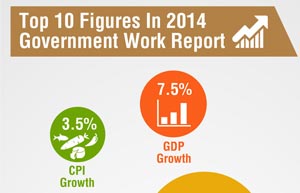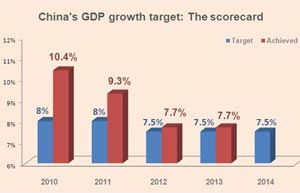J. P. Morgan forecasts China growth at nearly 7.5%
(Xinhua) Updated: 2014-03-13 11:26"We are forecasting that the growth will fall short of the 7.5-percent target, but won't break meaningfully below 7 percent this year," J. P. Morgan chief economist Bruce Kasman told reporters here on Wednesday.
The world's second largest economy is experiencing a "significant adjustment" after a long period of rapid credit growth, according to the economist, but that is unlikely to pose a major hurdle to China's fast growth over the decades.
|
 |
|
 |
The Chinese government has set its GDP growth target for 2014 at "about 7.5 percent," the same as last year, as Premier Li Keqiang said in a government work report delivered to an annual session of the National People's Congress on March 5.
Kasman predicted the global economic growth in 2014 would be solid, though volatility inevitably exists across the global market, and situations are quite differentiated in different countries and regions.
The United States and Western Europe will lead global growth, according to the economist, due to their healing private sectors and better macroeconomic policies that support growth.
Their demand will help support emerging markets this year, Kasman noted.
The chief economist has forecasted the 2014 GDP growth for the United States at close to 3 percent, and Western Europe at a little more than 1.5 percent.
However, the chief economist warned that challenges remain in the developed economies, such as low utilization rate, deteriorating productivity performances and high debt levels in the public sector.
"We are worried that we are not getting enough growth and healing to help deal with those problems set ahead," he said.
Asked whether the current Ukrainian turmoil will pose a threat to the global economy, Kasman said the effects are likely to be localized in 2014.
Despite the volatile situation at present, there has so far been no gas pipelines shut off from Western Europe as a result of the crisis, and Russian banks and firms still have access to Western financial institutions, according to Kasman.
"Obviously there is risk that we could be wrong but this is the baseline we are working with," he added.
|
 |
 |
- NHTSA says finds no 'defect trend' in Tesla Model S sedans
- WTO rare earth ruling is unfair
- Amway says 2014 China sales may grow 8%
- President Xi in Europe: Forging deals, boosting business
- CNOOC releases 2013 sustainability report
- Local production by Chery Jaguar Land Rover this year
- Car lovers test their need for speed in BMW Mission 3
- China stocks close mixed Monday

















